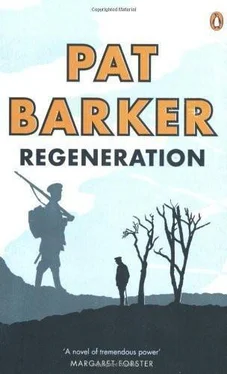Rivers was aware, as a constant background to his work, of a conflict between his belief that the war must be fought to a finish, for the sake of the succeeding generations, and his horror that such events as those which had led to Burns’s breakdown should be allowed to continue. This conflict, though a constant feature of his life, would certainly have been strengthened by his conversations with Sassoon. He’d been thinking about Sassoon immediately before he went to sleep. But, on thinking it over, Rivers couldn’t see that the dream was a likely dramatization of that conflict. The war was hardly an experiment, and it certainly didn’t rest with him to decide whether it continued or not.
Recently almost all his dreams had centred on conflicts arising from his treatment of particular patients. In advising them to remember the traumatic events that had led to their being sent here, he was, in effect, inflicting pain, and doing so in pursuit of a treatment that he knew to be still largely experimental. Only in Burns’s case had he found it impossible to go on giving this advice, because the suffering involved in Burns’s attempts to remember was so extreme. ‘Extreme’. The word Head had used to describe the pain he’d experienced during the protopathic stage of regeneration. Certainly in Burns’s case, there was a clear conflict between Rivers’s desire to continue using a method of treatment he believed in, but knew to be experimental, and his sense that in this particular instance the pain involved in insisting on the method would be too great.
The dream had not merely posed a problem, it had suggested a solution. ‘Why don’t you try it?’ Henry had said. Rivers felt he’d got there first, that the dream lagged behind his waking practice: he was already experimenting on himself. In leading his patients to understand that breakdown was nothing to be ashamed of, that horror and fear were inevitable responses to the trauma of war and were better acknowledged than suppressed, that feelings of tenderness for other men were natural and right, that tears were an acceptable and helpful part of grieving, he was setting himself against the whole tenor of their upbringing. They’d been trained to identify emotional repression. as the essence of manliness. Men who broke down, or cried, or admitted to feeling fear, were sissies, weaklings, failures. Not men . And yet he himself was a product of the same system, even perhaps a rather extreme product. Certainly the rigorous repression of emotion and desire had been the constant theme of his adult life. In advising his young patients to abandon the attempt at repression and to let themselves feel the pity and terror their war experience inevitably evoked, he was excavating the ground he stood on.
The change he demanded of them — and by implication of himself — was not trivial. Fear, tenderness — these emotions were so despised that they could be admitted into consciousness only at the cost of redefining what it meant to be a man. Not that Rivers’s treatment involved any encouragement of weakness or effeminacy. His patients might be encouraged to acknowledge their fears, their horror of the war — but they were still expected to do their duty and return to France. It was Rivers’s conviction that those who had learned to know themselves, and to accept their emotions, were less likely to break down again.
In a moment or two an orderly would tap on the door and bring in his tea. He put the notebook and pencil back on the bedside table. Henry would be amused by that dream, he thought. If wish fulfilment had been involved at all, it was surely one of Henry’s wishes that had been fulfilled. At the time of the nerve regeneration experiments, they’d done a series of control experiments on the glans penis, and Henry had frequently expressed the desire for a reciprocal application of ice cubes, bristles, near-boiling water and pins.
Prior sat with his arms folded over his chest and his head turned slightly away. His eyelids looked raw from lack of sleep.
‘When did your voice come back?’ Rivers asked.
‘In the middle of the night. I woke up shouting and suddenly I realized I could talk. It’s happened before.’
A Northern accent, not ungrammatical, but with the vowel sounds distinctly flattened, and the faintest trace of sibilance. Hearing Prior’s voice for the first time had the curious effect of making him look different. Thinner, more defensive. And, at the same time, a lot tougher. A little, spitting, sharp-boned alley cat.
‘It comes and goes?’
‘Yes.’
‘What makes it go?’
Another shrug from the repertoire. ‘When I get upset.’
‘And coming here upset you?’
‘I’d have preferred somewhere further south.’
So would I. ‘What did you do before the war?’
‘I was a clerk in a shipping office.’
‘Did you like it?’
‘No. It was boring. ’ He looked down at his hands and immediately up again. ‘What did you do?’
Rivers hesitated. ‘Research. Teaching.’
‘Did you like it?’
‘Yes, very much. Research more than teaching probably, but…’ He shrugged. ‘I enjoy teaching.’
‘I noticed. “Two l’s in physically, Mr Prior.”’
‘What an insufferable thing to say.’
‘I thought so.’
‘I’m sorry.’
Prior didn’t know what to say to that. He looked down at his hands and mumbled, ‘Yes, well.’
‘By the way, your file arrived this morning.’
Prior smiled. ‘So you know all about me, then?’
‘Oh, I wouldn’t say that. What did become clear is that you had a spell in the 13th Casualty Clearing Station in…’ He looked at the file again. ‘January. Diagnosed neurasthenic.’
Prior hesitated. ‘Ye-es.’
‘Deep reflexes abnormal.’
‘Yes.’
‘But on that occasion no trouble with the voice? Fourteen days later you were back in the line. Fully recovered?’
‘I’d stopped doing the can-can, if that’s what you mean.’
‘Were there any remaining symptoms?’
‘Headaches.’ He watched Rivers make a note. ‘It’s hardly a reason to stay out of the trenches, is it? “Not tonight, Wilhelm. I’ve got a headache” ?’
‘It might be. It rather depends how bad they were.’ He waited for a reply, but Prior remained obstinately silent. ‘You were back in the 13th CCS in April. This time unable to speak.’
‘I’ve told you, I don’t remember.’
‘So the loss of memory applies to the later part of your service in France, but the early part — the first six months or so — is comparatively clear?’
‘Ye-es.’
Rivers sat back in his chair. ‘Would you like to tell me something about that early part?’
‘No.’
‘But you do remember it?’
‘Doesn’t mean I want to talk about it.’ He looked round the room. ‘I don’t see why it has to be like this anyway.’
‘Like what?’
‘All the questions from you , all the answers from me. Why can’t it be both ways?’
‘Look, Mr Prior, if you went to the doctor with bronchitis and he spent half the consultation time telling you about his lumbago, you would not be pleased. Would you?’
‘No, but if I went to my doctor in despair it might help to know he at least understood the meaning of the word.’
‘Are you in despair?’
Prior sighed, ostentatiously impatient.
‘You know, I talk to a lot of people who are in despair or very close to it, and my experience is that they don’t care what the doctor feels. That’s the whole point about despair, isn’t it? That you turn in on yourself.’
Читать дальше












